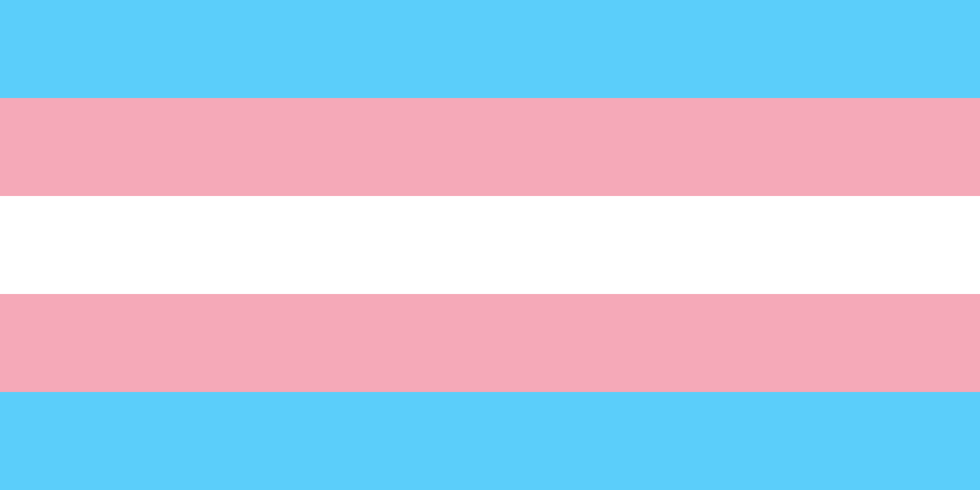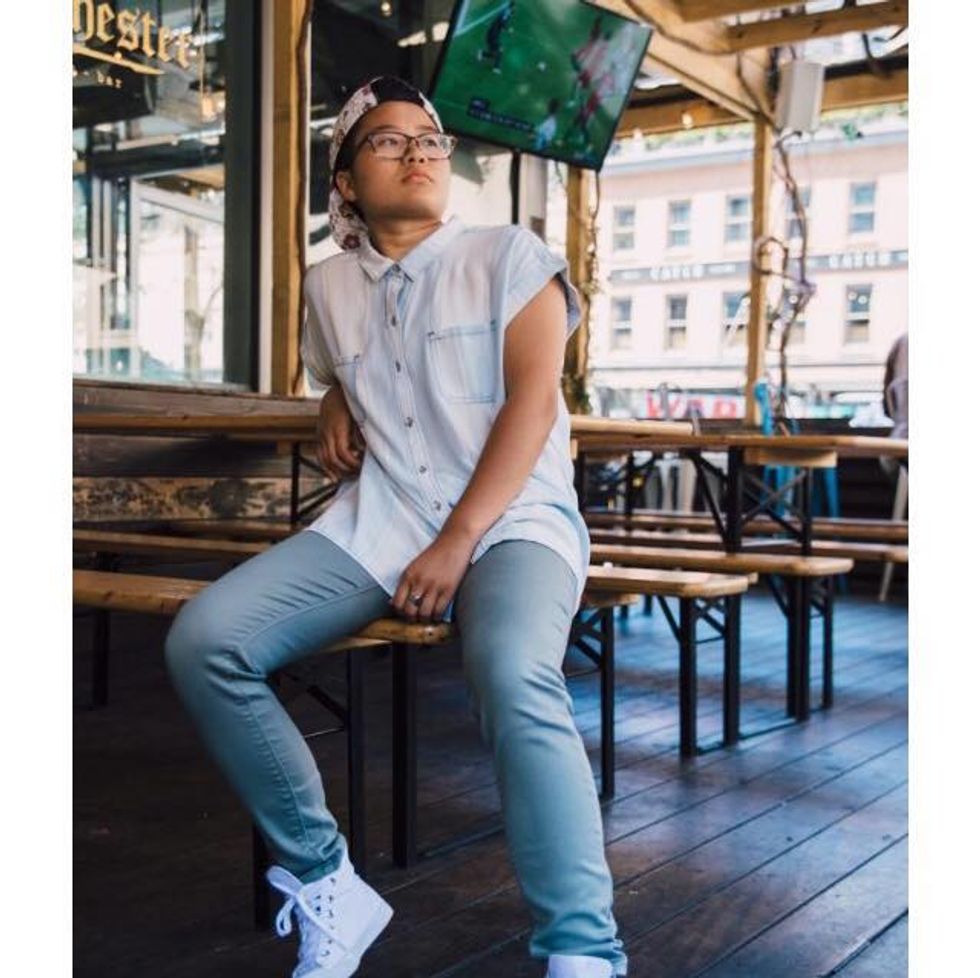I have known Felix for almost 6 years now and for most of that time I knew him as a woman. Felix and I went to high school together at an all girls’ school. At the time, he was openly gay, preferring to date females over males, and I never once considered that one day he would be going by a new name, preferring different pronouns, and eventually be taking testosterone. Either way, he is an amazing friend to have and graciously agreed to allow me to interview him to spread more awareness about the trans community.
Q: When did you first begin to understand that you were transgender?
A: I don't think there was ever a defining moment where I thought “man, I think I’m trans.” It was kind of like gentle undertones throughout my childhood; not having the words for what I was feeling, and then kind of repressing those feelings through middle and high school. I started connecting what I was feeling and transness when I was 18; identifying as gender fluid, then non-binary, then trans non-binary. Even then, trans is not a simple identity, there are multiple layers to it, such as gender expression, name, pronouns, physical appearances. Especially with non-binary identities, there is more figuring out to do, such as what types of surgeries or hormones, how masculine or feminine to present as, what types of pronouns feel most comfortable, etc. For instance, I came to realize that I wanted to start hormones and eventually get top surgery but at the moment I don't want bottom surgery.
Q: What is the difference between “genderqueer” and “transgender”?
A: Terms and labels are changing and evolving constantly, and the semantics vary from person to person. Personally, I see genderqueer as a looser term for gender identity and expression. I think a lot of non-binary and gender nonconforming people may be more likely to identify as genderqueer rather than trans, but they may also identify as both. Trans can sometimes be viewed as a more binary cookie cutter term, such as female to male, or male to female, whereas genderqueer may push gender boundaries further and dance along the lines of androgyny.
Q: When we were in high school together, did you know you were transgender? If so, how was that?
A: I don't think I ever thought I was trans, but I did feel a pressure to walk and dress more femininely. Sometimes it felt like I was putting on an act, like I was trying to be a “better” version of myself. I also may have never contemplated transitioning because that would mean I wouldn't be able to go to Mercy, which would have been scary because Mercy was kind of like a second home for me.
Q: Have you received any backlash from friends or family since you have come out?
A: I have not received any backlash from friends. I’ve been lucky enough to be surrounded by so many open-minded and supportive people. However, my family has made it very difficult for me. My mother has been tolerant but unsupportive of my transition. I am unable to come out to the rest of my family because I have been told that my grandmother must never know. I dread Thanksgiving and Christmas, because it will feel like a giant secret, and now that I’m on hormones it seems impossible for people not to be able to tell. Coming out to my mother has definitely hurt our relationship. I feel that words have been exchanged from both sides that were well-intentioned but very hurtful and it’s going to take a lot to mend that relationship.
Q: How has your transition affected your Catholic upbringing (if at all)?
A: I’d say my relationship with the catholic church was cut off the most when I was exploring my sexuality. Catholicism became a source of pain and shame and I distanced myself a lot from it because of that. I feel a lot more comfortable with it now, and I now see that there are many perspectives and beliefs from the Catholic church. As far as my trans identity I don't feel that it has been as influential.
Q: Please explain the transition process and what a person goes through to
transition.
A: So people take a lot of different paths in the trans community. Some people choose to just change their names and pronouns, some people choose to have multiple surgeries and go on hormones. There are a lot of different choices. For a trans masculine person, testosterone, top surgery, and bottom surgery are an option. For trans femme people, hormones, facial reconstruction, top and bottom surgery are also an option. Among these are many different types of surgeries, with different outcomes. Personally, I’ve been on hormones for 3 and a half months, I think eventually I’ll get top surgery, but I think I would be content stopping there. Legally, I’d like to change my name and gender marker on my license, because that can be an uncomfortable conversation with police.
Q: What are some of the struggles you have personally faced since coming out?
A: Since coming out and starting testosterone, I’ve had to give up rugby, my family, and peeing in public places. For rugby, I’m not allowed to play on the women's team because of testosterone, and I can’t play on the men's team until I’ve had top surgery and have been two years on testosterone. The women’s team has been very supportive and continued to include me in a lot of the events; however, I can't play the sport and I feel a much different dynamic because of that. My mother is horrified that I’ve started taking hormones, and I've been guilted by other members of my family for making my mother miserable. Now that I’m on testosterone I find that I sometimes pass, mainly with men, and therefore I no longer know which bathroom to use. I was at the movie theater the other night and I ended up waiting an extra fifteen/twenty minutes outside the bathroom just to make sure that no one would come in if I was there. I’m often late to class waiting to use the gender neutral bathroom because it is single stall only, and a lot of guys use it because it used to be the men’s restroom.
Q: What should people avoid doing or saying to a transgender person?
A: I think as long as it’s well-meaning and you approach the subject with an authentic curiosity it is generally perceived well. A lot of people ask me how to ask a trans person their pronouns, and I would say automatically use they/them with someone you don't know because you never want to assume. You can also introduce yourself with your own pronouns that way it doesn't seem like you're asking someone if they’re trans or not. You can also pull someone aside and ask them what pronouns they prefer. It’s a little weird if you ask someone if they’re trans because that’s not really necessary. It can also be offensive to say things like “Oh, I never would have guessed you were trans” because it makes it seem like you should be able to tell, or like trans people look different from other people. If you make a mistake, like with pronouns, address it and move on. It happens, and as long as the person recognizes it and apologizes it’s an easy fix.
Q: What can the world do to make transgender people feel more comfortable to be themselves?
A: Being more conscience of pronouns is a big one. I understand if I get mis-gendered but it definitely doesn't feel good. Don't be afraid to ask questions and learn more about the trans community. I also think having more trans visibility in media would help solve a lot of negative or harmful stereotypes. And obviously violence against trans people. One of the reasons I transitioned at my college is because I'm fearful of my safety when I walk out into other public spaces. I never know how someone is going to react. A simple everyday task such as going to the grocery store in a more conservative area can often have me looking over my shoulder.

















